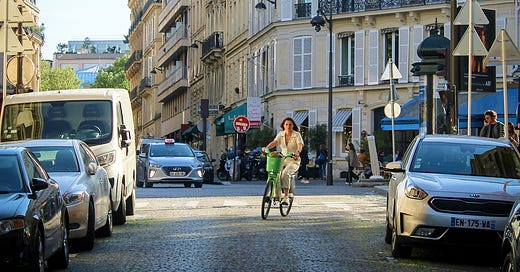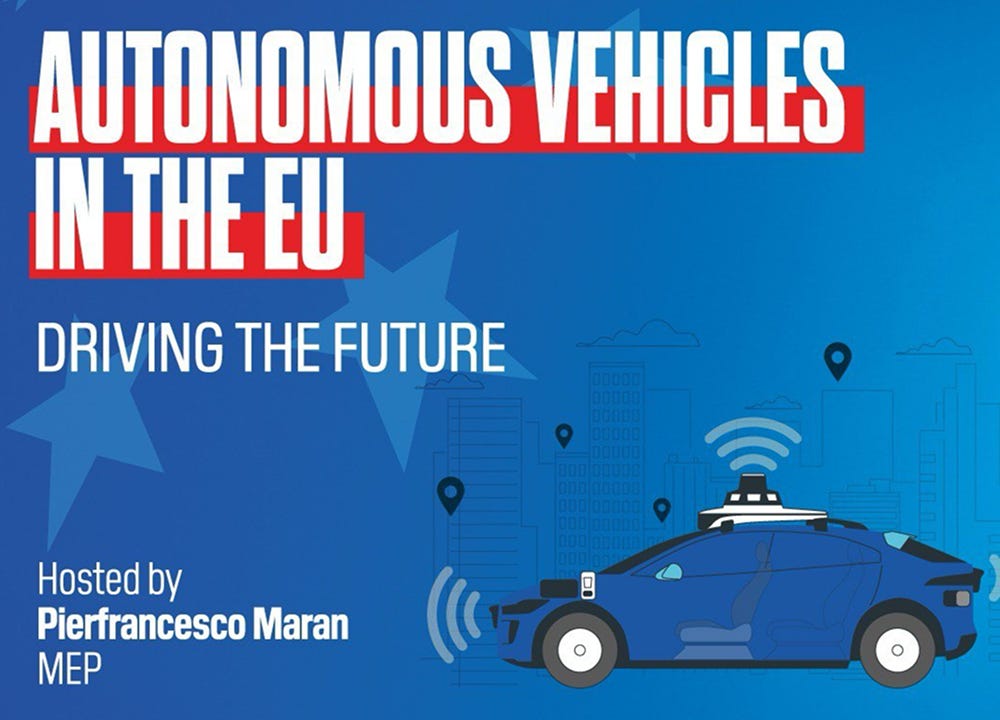Welcome to CoMotion NEWS, your weekly roundup of news and analysis of the mobility revolution. If this email was forwarded, you can sign up here for NEWS.
In five days, Tesla faces a major test that may very well determine whether it remains the world’s most valuable automaker. Elon Musk has said the company’s future hinges on autonomous ride-hailing, which he’s been promising is just around the corner for over a decade. Now that Waymo and others are coming pretty close to fulfilling that promise, the pressure is on Tesla to deliver when it launches its first fleet of robotaxis in Austin on June 22. If Tesla can’t match Waymo, let alone surpass it, what remains to justify its trillion-dollar market cap? Certainly not car sales. But whatever one thinks of Musk and Tesla, we must hope that their robotaxis perform better than some of the test videos suggest they will.
Speaking of robotaxis, they’re supposed to reduce prices, but there are clearly plenty of people who will pay more for a driverless ride.
In good news for micromobility, Paris expands its world-class bike-sharing program and Lime records 1 million rides in one day. And in bad news for micromobility, Perth halts its scooter-sharing program after a deadly crash and Spin pulls out of San Marcos, Tex., citing costs imposed by tariffs.
What you need to know
“We’re being super paranoid about safety”: Tesla’s highly anticipated robotaxi trial in Austin, Tex. was supposed to launch on June 12 –– now the “tentative” launch date is June 22, according to Elon Musk. “We are being super paranoid about safety, so the date could shift,” he tweets.
…why might they be worried about safety? It’s not hard to understand why Tesla might be feeling “super paranoid” about safety if you watch the troubling demo the company held for local news media in Austin. In six consecutive attempts, the driverless Tesla fails to yield to a school bus stop sign and runs over a child-sized dummy crossing the street. Yikes.
Trump revokes California’s EV mandates –– court battle to ensue: The president signs three Congressional Review Act resolutions passed by Congress to revoke the Golden State’s tailpipe emissions standards, which essentially ban gas-powered cars by 2035. Keep in mind, however, that both the Senate parliamentarian and the Government Accountability Office said that Congress cannot use the CRA to kibosh California’s unique legal authority, established by the federal government 50 years ago, to set its own emissions standards. So California and 10 other states that have adopted similarly stringent emissions standards are suing. The battle has only begun.
Vive le velo: The French capital, which since the pandemic has transformed itself into a biker’s paradise, awards Lime, Voi and Dott four-year contracts to operate its new shared e-bike program. Each company will be able to eventually scale up to 7,500 e-bikes. Keep in mind: this is in addition to Paris’s longstanding Vèlib program, the wildly popular pedal bike sharing scheme.
Paying to avoid people: One of the big promises of the robotaxi revolution is that removing the driver will lower prices. But an analysis of a month’s worth of fares in San Francisco shows that people are paying substantially more for driverless rides from Waymo than human-operated Uber and Lyft rides. The average Waymo fare was $20.43, compared to $15.58 for Uber and $14.44 for Lyft. It’s not clear why people are paying more. Perhaps they perceive the ride to be smoother and safer. Or maybe they’re just anti-social.
Autonomous Vehicles in the European Union
📍 Room 5E2 Spinelli, European Parliament, Brussels 📅 July 2, 2025
Robotaxis are increasingly gaining traction in big American cities. But what about in Europe? CoMotion joins European Parliament Member Pierfrancesco Maran for a virtual meeting at 09:30 to 11:00 CET on June 18 to explore current and planned autonomous vehicle deployments in the E.U. Register here.
A second in-person session will take place at the European Parliament at 15:00 to 17:00 CET on July 2 with a discussion on the current state of AVs in Europe and a deep dive on AV policy and financing in the E.U. Register here.
Perth halts scooter-sharing after fatal crash: The western Australian city pauses its e-scooter-sharing program after a pedestrian was killed in a crash with an allegedly drunken scooter rider. There are plenty of valid concerns about the safety of e-scooters, but scooters don’t present nearly the threat to pedestrians as, say, cars, especially if rules are enforced to keep them off sidewalks. This is an example of the double-standard to which new technology is held.
Lime hits 1 million rides in a day: On May 30, a million rides were taken on Lime devices around the world. Lime has not only reached tremendous scale, but has actually become profitable, a rare feat in micromobility.
Spinning out over tariffs: Spin says it will soon end its scooter-sharing service San Marcos, Tex., citing low ridership and increased costs due to tariffs. The service had been operated through a partnership with the city and local Texas State University, both of which say they’re going to try to get Spin to stay. In case any city officials are reading, companies tend to respond well to money. Just an idea.
ICYMI
Read the CoMotion MIAMI ‘25 Impact Report!
Explore the standout themes and insights from this year’s edition — featuring expert perspectives on:
🏟️ Mega events and their impact long after the final whistle
💰 Financing sustainable urban transport, and innovative funding models
🚢 ✈️ The future of ports and airports, and how digital transformation is enabling smarter operations and improving the passenger experience
🤖 The path ahead for autonomy and advanced aerial mobility … and much more shaping the future of movement.
📌 Meet this year’s ICEX Spanish delegation of 9 cutting-edge companies, and discover what sets them apart.
🏆 See who took home the Miami-Dade County DTPW's Mobility Champion Awards, and explore pitches from the finalists of the Miami-Dade Innovation Authority’s (MDIA) fourth Public Innovation Challenge.
What we’re reading
Why more EVs = bigger gas stations: The EV era is super-charging a trend towards bigger gas stations. As fuel operators shift to EV charging, they will be under pressure to create spaces where people are willing (or even happy) to hang while their cars charge. That means the model championed by chains like Buc-ee’s and Sheetz –– where the gas station is marketed as a full-service dining and shopping destination –– is likely to become even more common.
Why empty bike lanes are good, actually: Writing for StreetsBlog, Nicole Gelinas of the Manhattan Institute addresses one of the most common gripes about bus and bike lanes voiced by aggrieved motorists: they’re always empty! Those lanes look empty, she writes, because the vehicles they are built for move far more efficiently than the single-occupancy vehicles stuck in traffic.
CoMotion's mobility goodness brought to you by:
Jack Craver,
Editor, CoMotion NEWS
jcraver@comotionglobal.com
Write to us if you would like to suggest content for our next newsletter!
Partner with us
Our events CoMotion LA, CoMotion MIAMI, and the Monaco Hydrogen Forum represent a unique opportunity to build global awareness in the industry. Build influence, elevate your brand, and connect with ground-breaking companies and public sector leaders.
“It's really exciting to be at this year's CoMotion, with the best, most creative, and innovative minds together thinking about solutions on how we advance transportation.” - Laura Rubio Cornejo, General Manager, LADOT
Email us if you are interested in learning more.
YouTube | LinkedIn | Podcast | X | Instagram





